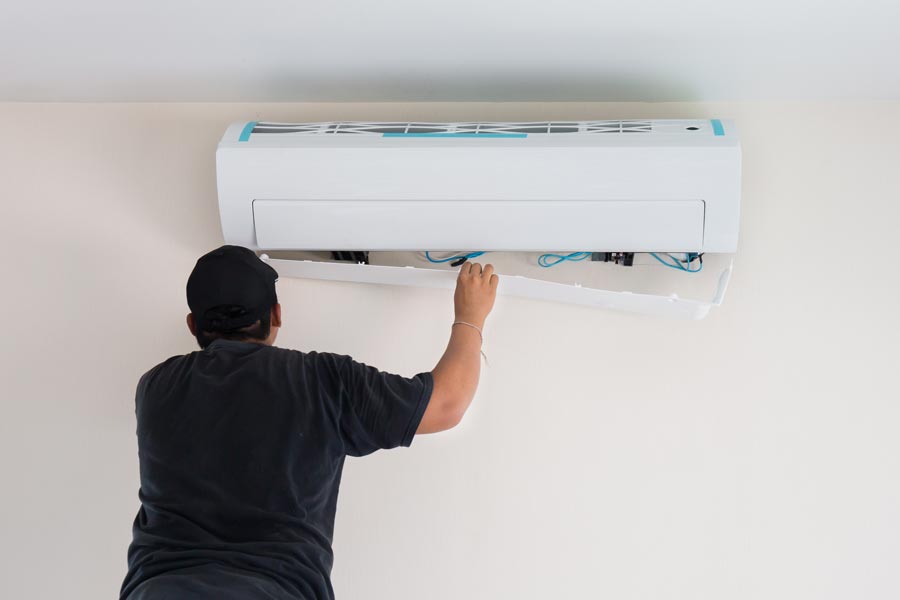For the vast majority of businesses, high-quality air conditioning is essential. However, choosing the right air conditioning system can be a challenge. Should you save money and choose an AC system that just meets your needs, or go all-out an invest in the best option on the market?
Like many other equipment-related decisions, the optimal choice for your business depends on a range of factors, from the square footage of your workspace or retail store to your location, the level of sunlight your space receives and the expectations of your customers.
Below, we’ve listed three tips to keep in mind when you’re choosing air conditioning equipment for installation in your place of business, from budgeting tactics to techniques for choosing the right AC unit(s) for your specific space.
First, choose the type of air conditioning system you need
There are several different types of air conditioning systems available for both businesses and home users. These include window air conditioners, through-the-wall air conditioners and mini-split air conditioners. There are also PTAC air conditioners.
Finally, duct air conditioners are designed for larger spaces that need extra cooling capacity that can’t be provided by smaller, less powerful units.
Each type of air conditioner offers specific advantages and disadvantages. Window AC units are inexpensive and ideal for small rooms, such as small offices and workspaces. Although this type of air conditioner is usually too small for business use, it can be ideal for a home setting.
Through-the-wall air conditioners are another good option for smaller spaces, such as offices or workspaces used by one or two people.
Many mid-sized offices and business will use mini-split air conditioners or PTAC air conditioners for cooling. However, larger offices and retail spaces will often get the best benefits from using a larger duct air conditioning system, which provides additional cooling power.
It’s important that you’re aware of the best option for your business before you invest in any type of air conditioning system. Speaking to an air conditioning installer and supplier will help you get a complete understanding of your needs and the best option for your business.
Second, choose equipment with a good SEER rating
SEER, which stands for “seasonal energy efficiency ratio,” is a measure of how energy efficient an air conditioner is. As a general rule, air conditioning units with a higher SEER rating are more energy efficient than units with a lower SEER rating.
The SEER rating of an air conditioner is determined by the cooling output of an air conditioning unit, divided by its total watt-hour energy consumption. Most of the time, air conditioners have a minimum SEER rating of 13 or 14, while some higher-efficiency units boast 21 to 25.
Over the long term, investing in an air conditioning system with a higher SEER rating can result in savings on your energy bill. However, since SEER is a variable rating (meaning your AC unit may not always perform at 21 SEER), it’s not the only factor to think of when AC shopping.
As always, the best approach is to speak to your air conditioning installer about the best choice for your business. While a higher SEER rating is generally a good thing from an energy usage perspective, it’s not always worth investing in the highest SEER-rated air conditioning unit.
Third, choose the right size of air conditioning unit
Every workspace or retail store is different, meaning it’s impossible to recommend one AC unit for every business. After all, the cooling requirements of a 300 square foot office are likely to be completely different from the requirements of a 2,000 square foot retail store.
From sunlight to air circulation, a variety of factors can affect the optimal size of air conditioner for your place of business. As such, you’ll usually need to consider several factors when picking an air conditioner. And don’t forget to pick a contractor that offers emergency AC repair.
One term that’s thrown around a lot in the air conditioning world is “tonnage” — the total cooling power of an air conditioning unit. The amount of tonnage your business needs depends on the factors listed above, from location and temperature to sunlight, square footage and more.
Just like with SEER ratings, it’s best to speak to a commercial air conditioning contractors about your air conditioning system’s output needs. There’s no one-size-fits-all answer to this question, meaning you’ll get the best results by opting for a unit that’s best suited to your specific office or retail location.

